Leadership Application Exercise: Coursework Analysis Units 2, 4, and 7
VerifiedAdded on 2022/12/14
|10
|1965
|203
Homework Assignment
AI Summary
This assignment presents a student's analysis of leadership concepts through application exercises from Units 2, 4, and 7. The student explores various leadership styles, including those of Mahatma Gandhi and Nelson Mandela, and reflects on personal leadership qualities. The assignment includes self-assessments of communication and confrontation skills, with detailed analyses of strengths, weaknesses, and areas for improvement. The student reflects on a personal experience involving workplace confrontation and applies leadership principles to resolve the situation. The document also includes post-test results, demonstrating the student's growth in communication and confrontation skills. Overall, the assignment demonstrates a practical application of leadership theories and a commitment to self-improvement.
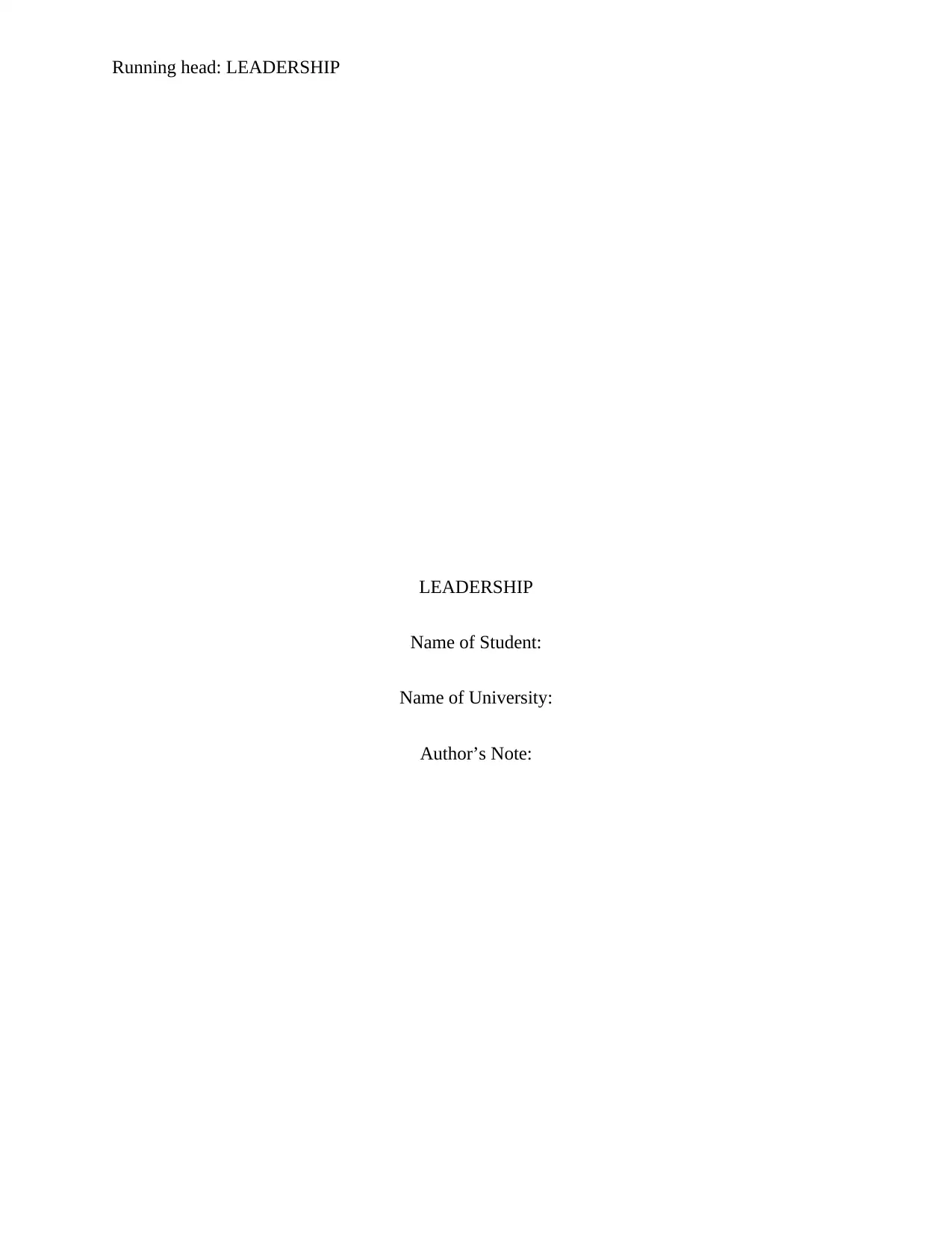
Running head: LEADERSHIP
LEADERSHIP
Name of Student:
Name of University:
Author’s Note:
LEADERSHIP
Name of Student:
Name of University:
Author’s Note:
Paraphrase This Document
Need a fresh take? Get an instant paraphrase of this document with our AI Paraphraser
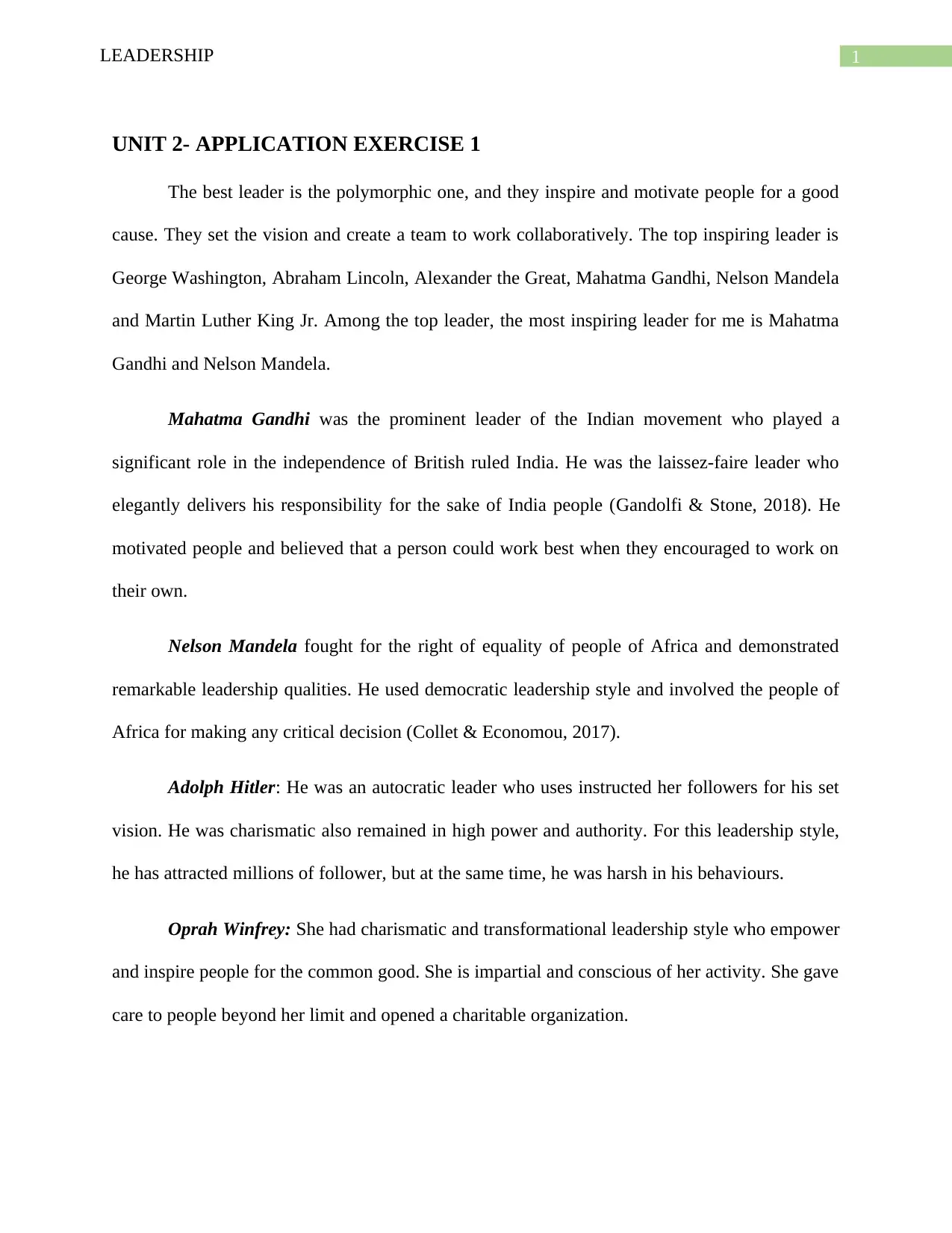
1LEADERSHIP
UNIT 2- APPLICATION EXERCISE 1
The best leader is the polymorphic one, and they inspire and motivate people for a good
cause. They set the vision and create a team to work collaboratively. The top inspiring leader is
George Washington, Abraham Lincoln, Alexander the Great, Mahatma Gandhi, Nelson Mandela
and Martin Luther King Jr. Among the top leader, the most inspiring leader for me is Mahatma
Gandhi and Nelson Mandela.
Mahatma Gandhi was the prominent leader of the Indian movement who played a
significant role in the independence of British ruled India. He was the laissez-faire leader who
elegantly delivers his responsibility for the sake of India people (Gandolfi & Stone, 2018). He
motivated people and believed that a person could work best when they encouraged to work on
their own.
Nelson Mandela fought for the right of equality of people of Africa and demonstrated
remarkable leadership qualities. He used democratic leadership style and involved the people of
Africa for making any critical decision (Collet & Economou, 2017).
Adolph Hitler: He was an autocratic leader who uses instructed her followers for his set
vision. He was charismatic also remained in high power and authority. For this leadership style,
he has attracted millions of follower, but at the same time, he was harsh in his behaviours.
Oprah Winfrey: She had charismatic and transformational leadership style who empower
and inspire people for the common good. She is impartial and conscious of her activity. She gave
care to people beyond her limit and opened a charitable organization.
UNIT 2- APPLICATION EXERCISE 1
The best leader is the polymorphic one, and they inspire and motivate people for a good
cause. They set the vision and create a team to work collaboratively. The top inspiring leader is
George Washington, Abraham Lincoln, Alexander the Great, Mahatma Gandhi, Nelson Mandela
and Martin Luther King Jr. Among the top leader, the most inspiring leader for me is Mahatma
Gandhi and Nelson Mandela.
Mahatma Gandhi was the prominent leader of the Indian movement who played a
significant role in the independence of British ruled India. He was the laissez-faire leader who
elegantly delivers his responsibility for the sake of India people (Gandolfi & Stone, 2018). He
motivated people and believed that a person could work best when they encouraged to work on
their own.
Nelson Mandela fought for the right of equality of people of Africa and demonstrated
remarkable leadership qualities. He used democratic leadership style and involved the people of
Africa for making any critical decision (Collet & Economou, 2017).
Adolph Hitler: He was an autocratic leader who uses instructed her followers for his set
vision. He was charismatic also remained in high power and authority. For this leadership style,
he has attracted millions of follower, but at the same time, he was harsh in his behaviours.
Oprah Winfrey: She had charismatic and transformational leadership style who empower
and inspire people for the common good. She is impartial and conscious of her activity. She gave
care to people beyond her limit and opened a charitable organization.
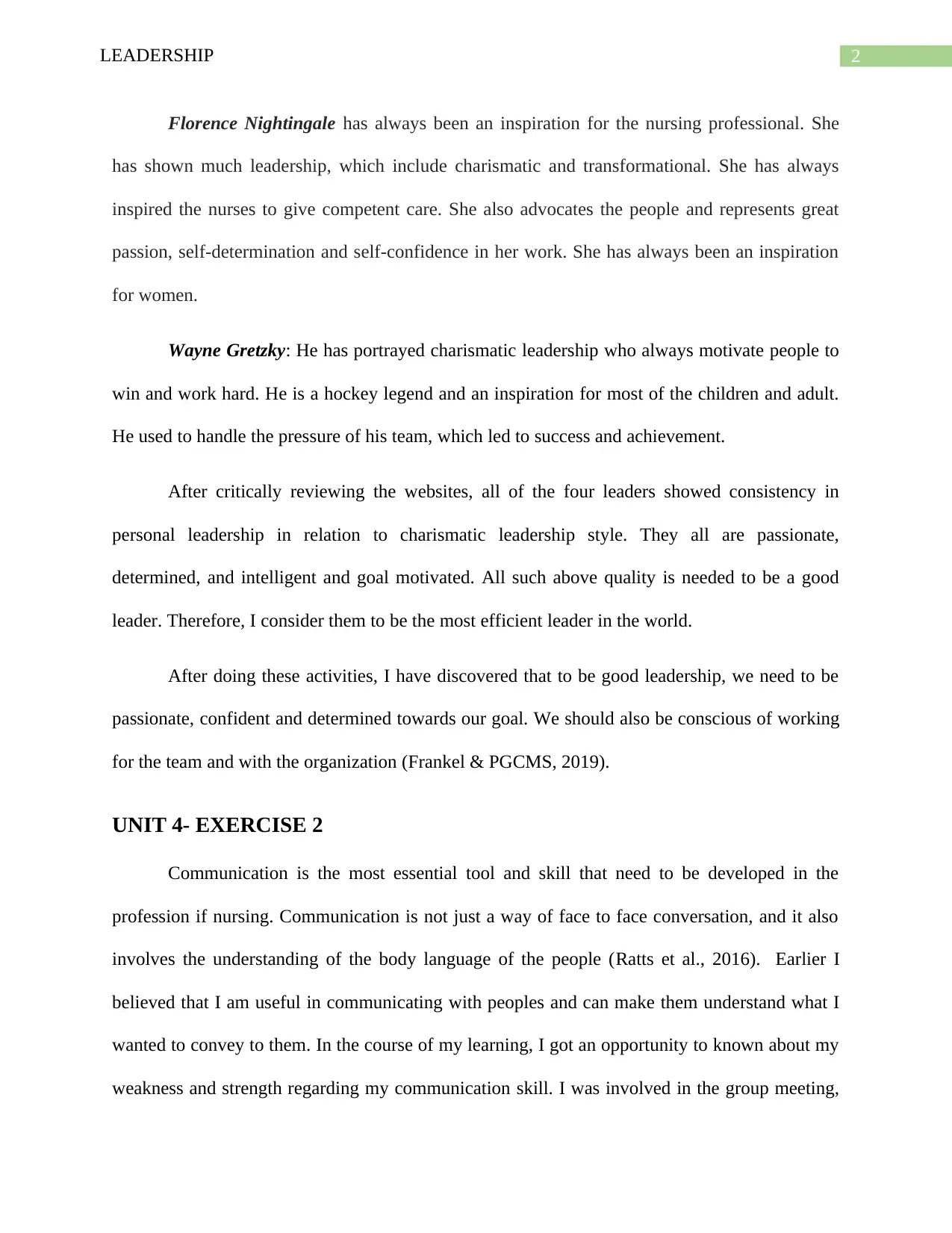
2LEADERSHIP
Florence Nightingale has always been an inspiration for the nursing professional. She
has shown much leadership, which include charismatic and transformational. She has always
inspired the nurses to give competent care. She also advocates the people and represents great
passion, self-determination and self-confidence in her work. She has always been an inspiration
for women.
Wayne Gretzky: He has portrayed charismatic leadership who always motivate people to
win and work hard. He is a hockey legend and an inspiration for most of the children and adult.
He used to handle the pressure of his team, which led to success and achievement.
After critically reviewing the websites, all of the four leaders showed consistency in
personal leadership in relation to charismatic leadership style. They all are passionate,
determined, and intelligent and goal motivated. All such above quality is needed to be a good
leader. Therefore, I consider them to be the most efficient leader in the world.
After doing these activities, I have discovered that to be good leadership, we need to be
passionate, confident and determined towards our goal. We should also be conscious of working
for the team and with the organization (Frankel & PGCMS, 2019).
UNIT 4- EXERCISE 2
Communication is the most essential tool and skill that need to be developed in the
profession if nursing. Communication is not just a way of face to face conversation, and it also
involves the understanding of the body language of the people (Ratts et al., 2016). Earlier I
believed that I am useful in communicating with peoples and can make them understand what I
wanted to convey to them. In the course of my learning, I got an opportunity to known about my
weakness and strength regarding my communication skill. I was involved in the group meeting,
Florence Nightingale has always been an inspiration for the nursing professional. She
has shown much leadership, which include charismatic and transformational. She has always
inspired the nurses to give competent care. She also advocates the people and represents great
passion, self-determination and self-confidence in her work. She has always been an inspiration
for women.
Wayne Gretzky: He has portrayed charismatic leadership who always motivate people to
win and work hard. He is a hockey legend and an inspiration for most of the children and adult.
He used to handle the pressure of his team, which led to success and achievement.
After critically reviewing the websites, all of the four leaders showed consistency in
personal leadership in relation to charismatic leadership style. They all are passionate,
determined, and intelligent and goal motivated. All such above quality is needed to be a good
leader. Therefore, I consider them to be the most efficient leader in the world.
After doing these activities, I have discovered that to be good leadership, we need to be
passionate, confident and determined towards our goal. We should also be conscious of working
for the team and with the organization (Frankel & PGCMS, 2019).
UNIT 4- EXERCISE 2
Communication is the most essential tool and skill that need to be developed in the
profession if nursing. Communication is not just a way of face to face conversation, and it also
involves the understanding of the body language of the people (Ratts et al., 2016). Earlier I
believed that I am useful in communicating with peoples and can make them understand what I
wanted to convey to them. In the course of my learning, I got an opportunity to known about my
weakness and strength regarding my communication skill. I was involved in the group meeting,
⊘ This is a preview!⊘
Do you want full access?
Subscribe today to unlock all pages.

Trusted by 1+ million students worldwide
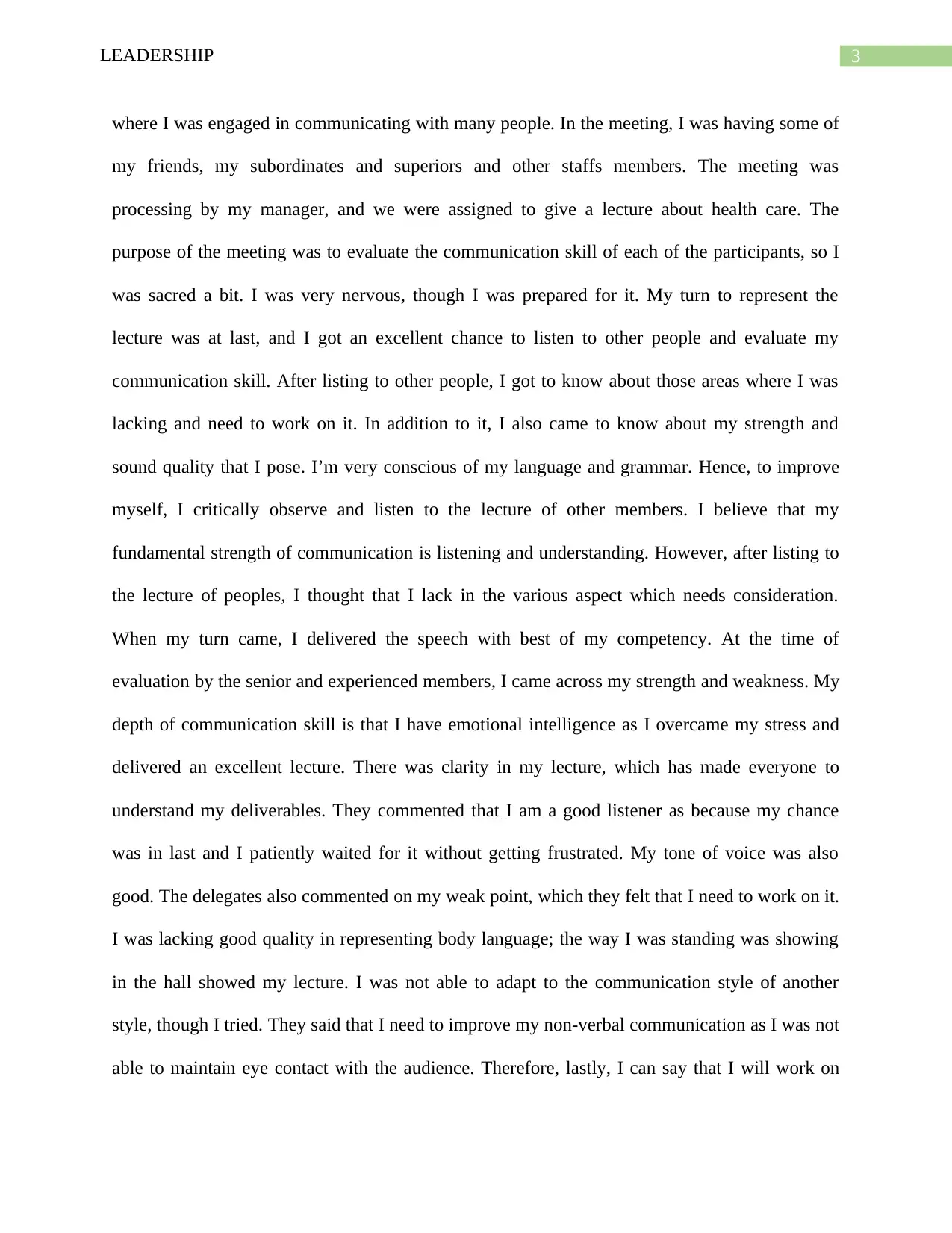
3LEADERSHIP
where I was engaged in communicating with many people. In the meeting, I was having some of
my friends, my subordinates and superiors and other staffs members. The meeting was
processing by my manager, and we were assigned to give a lecture about health care. The
purpose of the meeting was to evaluate the communication skill of each of the participants, so I
was sacred a bit. I was very nervous, though I was prepared for it. My turn to represent the
lecture was at last, and I got an excellent chance to listen to other people and evaluate my
communication skill. After listing to other people, I got to know about those areas where I was
lacking and need to work on it. In addition to it, I also came to know about my strength and
sound quality that I pose. I’m very conscious of my language and grammar. Hence, to improve
myself, I critically observe and listen to the lecture of other members. I believe that my
fundamental strength of communication is listening and understanding. However, after listing to
the lecture of peoples, I thought that I lack in the various aspect which needs consideration.
When my turn came, I delivered the speech with best of my competency. At the time of
evaluation by the senior and experienced members, I came across my strength and weakness. My
depth of communication skill is that I have emotional intelligence as I overcame my stress and
delivered an excellent lecture. There was clarity in my lecture, which has made everyone to
understand my deliverables. They commented that I am a good listener as because my chance
was in last and I patiently waited for it without getting frustrated. My tone of voice was also
good. The delegates also commented on my weak point, which they felt that I need to work on it.
I was lacking good quality in representing body language; the way I was standing was showing
in the hall showed my lecture. I was not able to adapt to the communication style of another
style, though I tried. They said that I need to improve my non-verbal communication as I was not
able to maintain eye contact with the audience. Therefore, lastly, I can say that I will work on
where I was engaged in communicating with many people. In the meeting, I was having some of
my friends, my subordinates and superiors and other staffs members. The meeting was
processing by my manager, and we were assigned to give a lecture about health care. The
purpose of the meeting was to evaluate the communication skill of each of the participants, so I
was sacred a bit. I was very nervous, though I was prepared for it. My turn to represent the
lecture was at last, and I got an excellent chance to listen to other people and evaluate my
communication skill. After listing to other people, I got to know about those areas where I was
lacking and need to work on it. In addition to it, I also came to know about my strength and
sound quality that I pose. I’m very conscious of my language and grammar. Hence, to improve
myself, I critically observe and listen to the lecture of other members. I believe that my
fundamental strength of communication is listening and understanding. However, after listing to
the lecture of peoples, I thought that I lack in the various aspect which needs consideration.
When my turn came, I delivered the speech with best of my competency. At the time of
evaluation by the senior and experienced members, I came across my strength and weakness. My
depth of communication skill is that I have emotional intelligence as I overcame my stress and
delivered an excellent lecture. There was clarity in my lecture, which has made everyone to
understand my deliverables. They commented that I am a good listener as because my chance
was in last and I patiently waited for it without getting frustrated. My tone of voice was also
good. The delegates also commented on my weak point, which they felt that I need to work on it.
I was lacking good quality in representing body language; the way I was standing was showing
in the hall showed my lecture. I was not able to adapt to the communication style of another
style, though I tried. They said that I need to improve my non-verbal communication as I was not
able to maintain eye contact with the audience. Therefore, lastly, I can say that I will work on
Paraphrase This Document
Need a fresh take? Get an instant paraphrase of this document with our AI Paraphraser
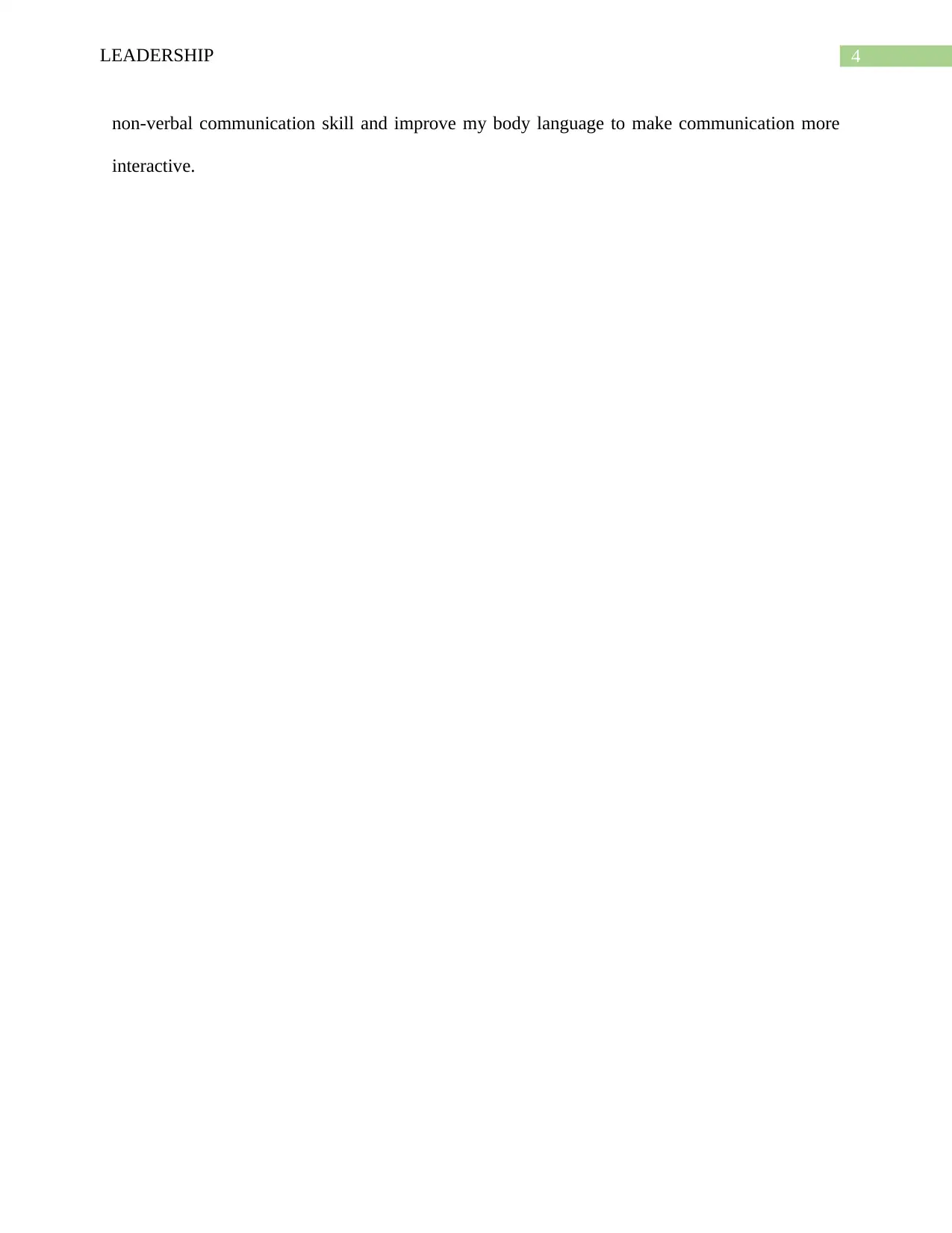
4LEADERSHIP
non-verbal communication skill and improve my body language to make communication more
interactive.
non-verbal communication skill and improve my body language to make communication more
interactive.
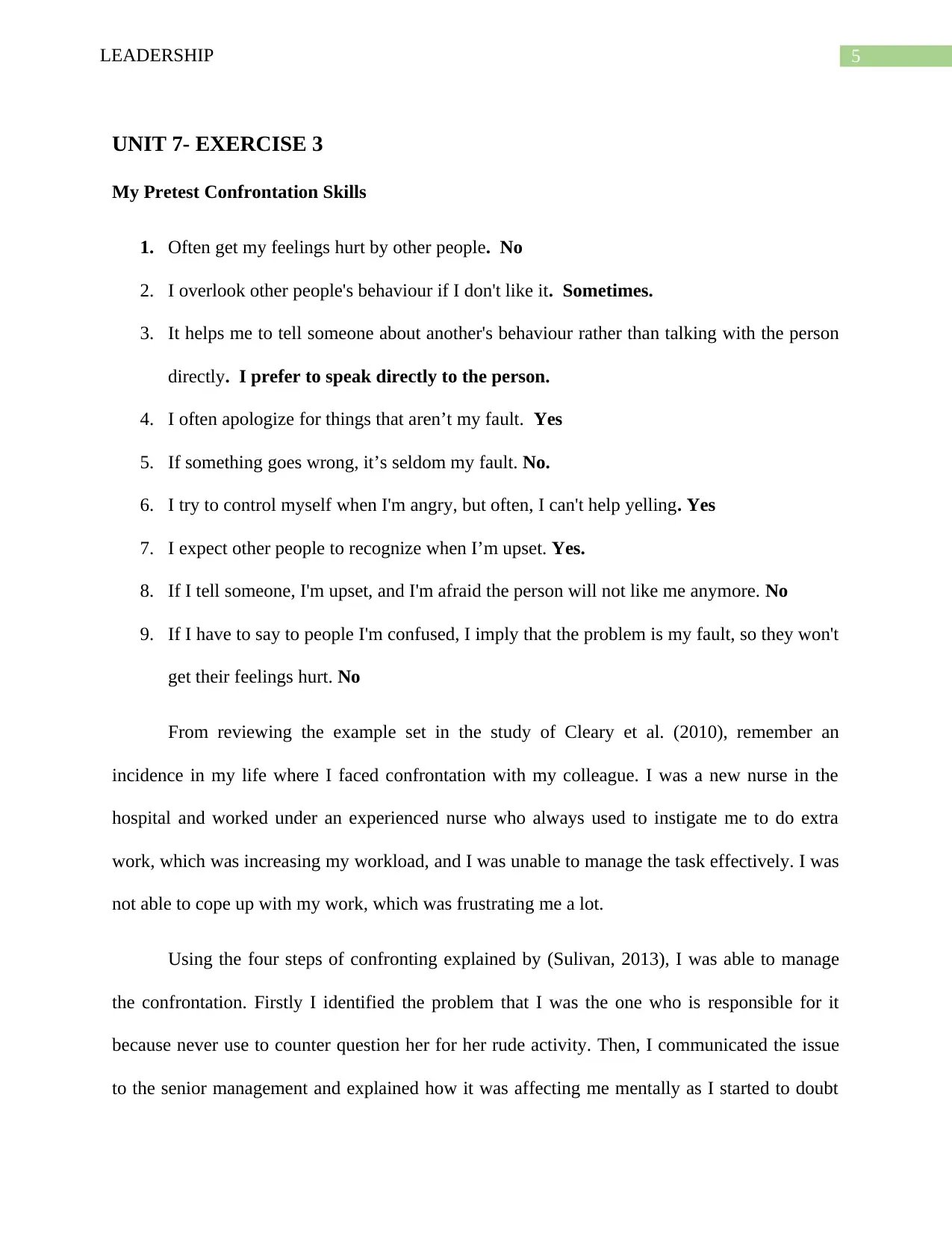
5LEADERSHIP
UNIT 7- EXERCISE 3
My Pretest Confrontation Skills
1. Often get my feelings hurt by other people. No
2. I overlook other people's behaviour if I don't like it. Sometimes.
3. It helps me to tell someone about another's behaviour rather than talking with the person
directly. I prefer to speak directly to the person.
4. I often apologize for things that aren’t my fault. Yes
5. If something goes wrong, it’s seldom my fault. No.
6. I try to control myself when I'm angry, but often, I can't help yelling. Yes
7. I expect other people to recognize when I’m upset. Yes.
8. If I tell someone, I'm upset, and I'm afraid the person will not like me anymore. No
9. If I have to say to people I'm confused, I imply that the problem is my fault, so they won't
get their feelings hurt. No
From reviewing the example set in the study of Cleary et al. (2010), remember an
incidence in my life where I faced confrontation with my colleague. I was a new nurse in the
hospital and worked under an experienced nurse who always used to instigate me to do extra
work, which was increasing my workload, and I was unable to manage the task effectively. I was
not able to cope up with my work, which was frustrating me a lot.
Using the four steps of confronting explained by (Sulivan, 2013), I was able to manage
the confrontation. Firstly I identified the problem that I was the one who is responsible for it
because never use to counter question her for her rude activity. Then, I communicated the issue
to the senior management and explained how it was affecting me mentally as I started to doubt
UNIT 7- EXERCISE 3
My Pretest Confrontation Skills
1. Often get my feelings hurt by other people. No
2. I overlook other people's behaviour if I don't like it. Sometimes.
3. It helps me to tell someone about another's behaviour rather than talking with the person
directly. I prefer to speak directly to the person.
4. I often apologize for things that aren’t my fault. Yes
5. If something goes wrong, it’s seldom my fault. No.
6. I try to control myself when I'm angry, but often, I can't help yelling. Yes
7. I expect other people to recognize when I’m upset. Yes.
8. If I tell someone, I'm upset, and I'm afraid the person will not like me anymore. No
9. If I have to say to people I'm confused, I imply that the problem is my fault, so they won't
get their feelings hurt. No
From reviewing the example set in the study of Cleary et al. (2010), remember an
incidence in my life where I faced confrontation with my colleague. I was a new nurse in the
hospital and worked under an experienced nurse who always used to instigate me to do extra
work, which was increasing my workload, and I was unable to manage the task effectively. I was
not able to cope up with my work, which was frustrating me a lot.
Using the four steps of confronting explained by (Sulivan, 2013), I was able to manage
the confrontation. Firstly I identified the problem that I was the one who is responsible for it
because never use to counter question her for her rude activity. Then, I communicated the issue
to the senior management and explained how it was affecting me mentally as I started to doubt
⊘ This is a preview!⊘
Do you want full access?
Subscribe today to unlock all pages.

Trusted by 1+ million students worldwide
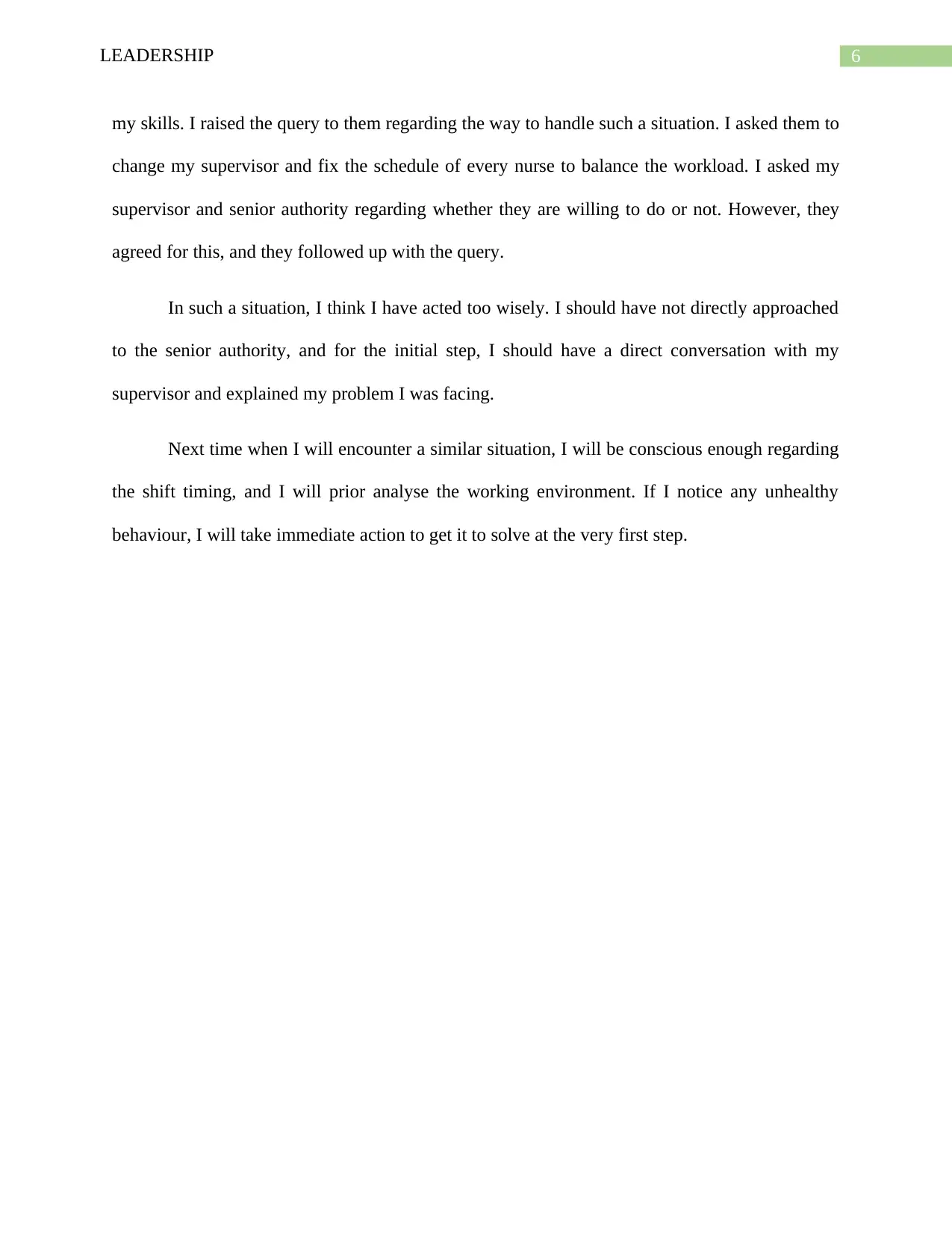
6LEADERSHIP
my skills. I raised the query to them regarding the way to handle such a situation. I asked them to
change my supervisor and fix the schedule of every nurse to balance the workload. I asked my
supervisor and senior authority regarding whether they are willing to do or not. However, they
agreed for this, and they followed up with the query.
In such a situation, I think I have acted too wisely. I should have not directly approached
to the senior authority, and for the initial step, I should have a direct conversation with my
supervisor and explained my problem I was facing.
Next time when I will encounter a similar situation, I will be conscious enough regarding
the shift timing, and I will prior analyse the working environment. If I notice any unhealthy
behaviour, I will take immediate action to get it to solve at the very first step.
my skills. I raised the query to them regarding the way to handle such a situation. I asked them to
change my supervisor and fix the schedule of every nurse to balance the workload. I asked my
supervisor and senior authority regarding whether they are willing to do or not. However, they
agreed for this, and they followed up with the query.
In such a situation, I think I have acted too wisely. I should have not directly approached
to the senior authority, and for the initial step, I should have a direct conversation with my
supervisor and explained my problem I was facing.
Next time when I will encounter a similar situation, I will be conscious enough regarding
the shift timing, and I will prior analyse the working environment. If I notice any unhealthy
behaviour, I will take immediate action to get it to solve at the very first step.
Paraphrase This Document
Need a fresh take? Get an instant paraphrase of this document with our AI Paraphraser
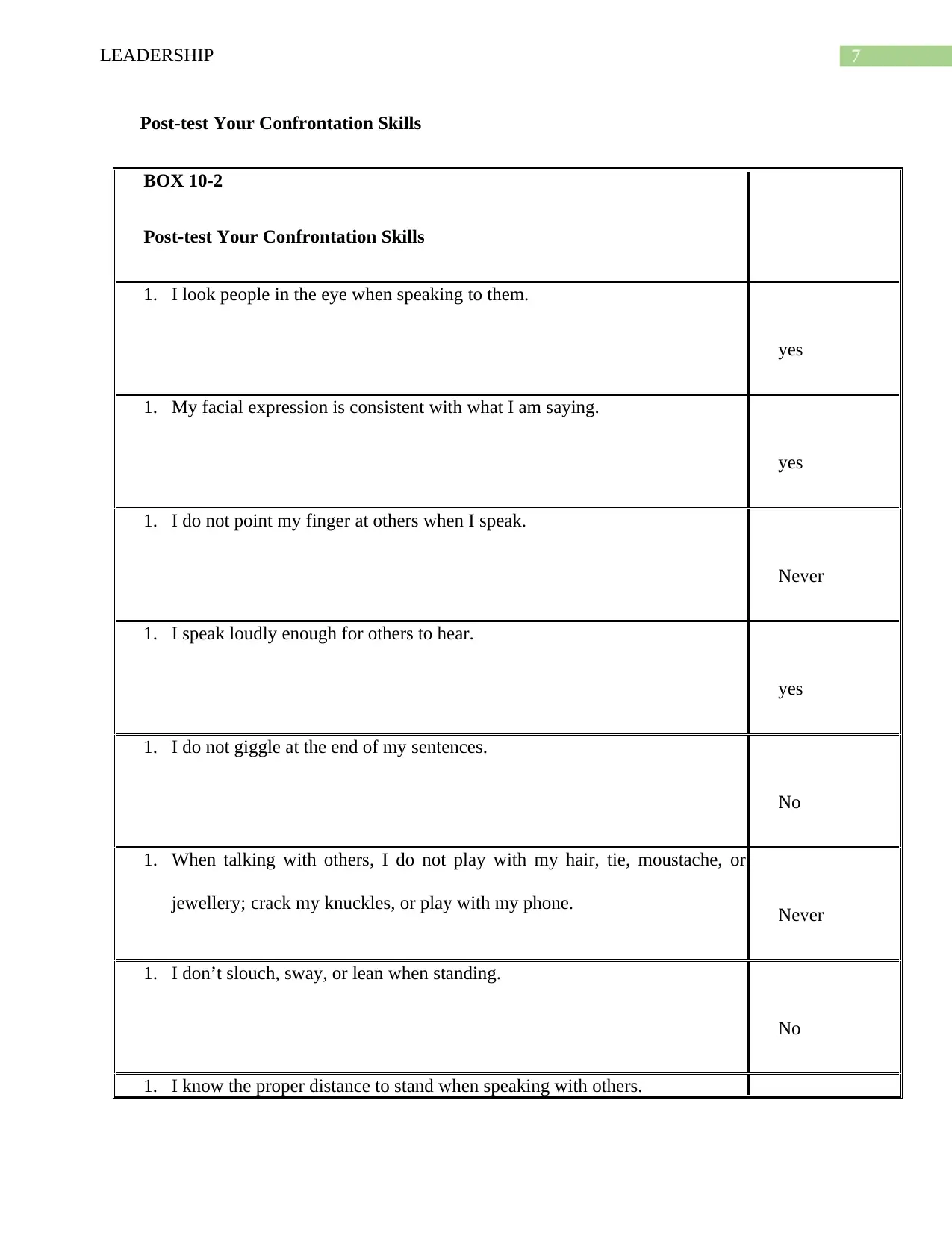
7LEADERSHIP
Post-test Your Confrontation Skills
BOX 10-2
Post-test Your Confrontation Skills
1. I look people in the eye when speaking to them.
yes
1. My facial expression is consistent with what I am saying.
yes
1. I do not point my finger at others when I speak.
Never
1. I speak loudly enough for others to hear.
yes
1. I do not giggle at the end of my sentences.
No
1. When talking with others, I do not play with my hair, tie, moustache, or
jewellery; crack my knuckles, or play with my phone. Never
1. I don’t slouch, sway, or lean when standing.
No
1. I know the proper distance to stand when speaking with others.
Post-test Your Confrontation Skills
BOX 10-2
Post-test Your Confrontation Skills
1. I look people in the eye when speaking to them.
yes
1. My facial expression is consistent with what I am saying.
yes
1. I do not point my finger at others when I speak.
Never
1. I speak loudly enough for others to hear.
yes
1. I do not giggle at the end of my sentences.
No
1. When talking with others, I do not play with my hair, tie, moustache, or
jewellery; crack my knuckles, or play with my phone. Never
1. I don’t slouch, sway, or lean when standing.
No
1. I know the proper distance to stand when speaking with others.
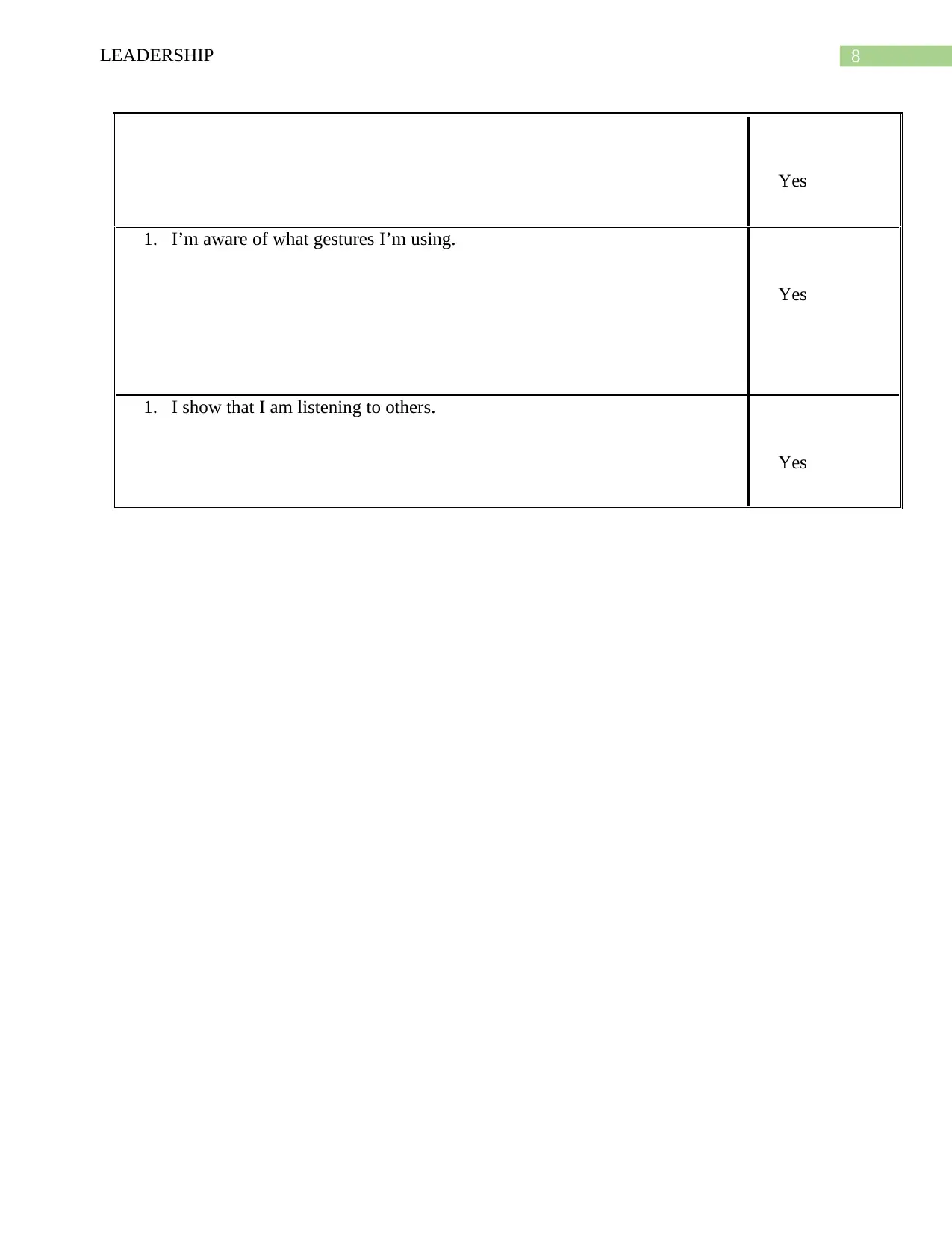
8LEADERSHIP
Yes
1. I’m aware of what gestures I’m using.
Yes
1. I show that I am listening to others.
Yes
Yes
1. I’m aware of what gestures I’m using.
Yes
1. I show that I am listening to others.
Yes
⊘ This is a preview!⊘
Do you want full access?
Subscribe today to unlock all pages.

Trusted by 1+ million students worldwide
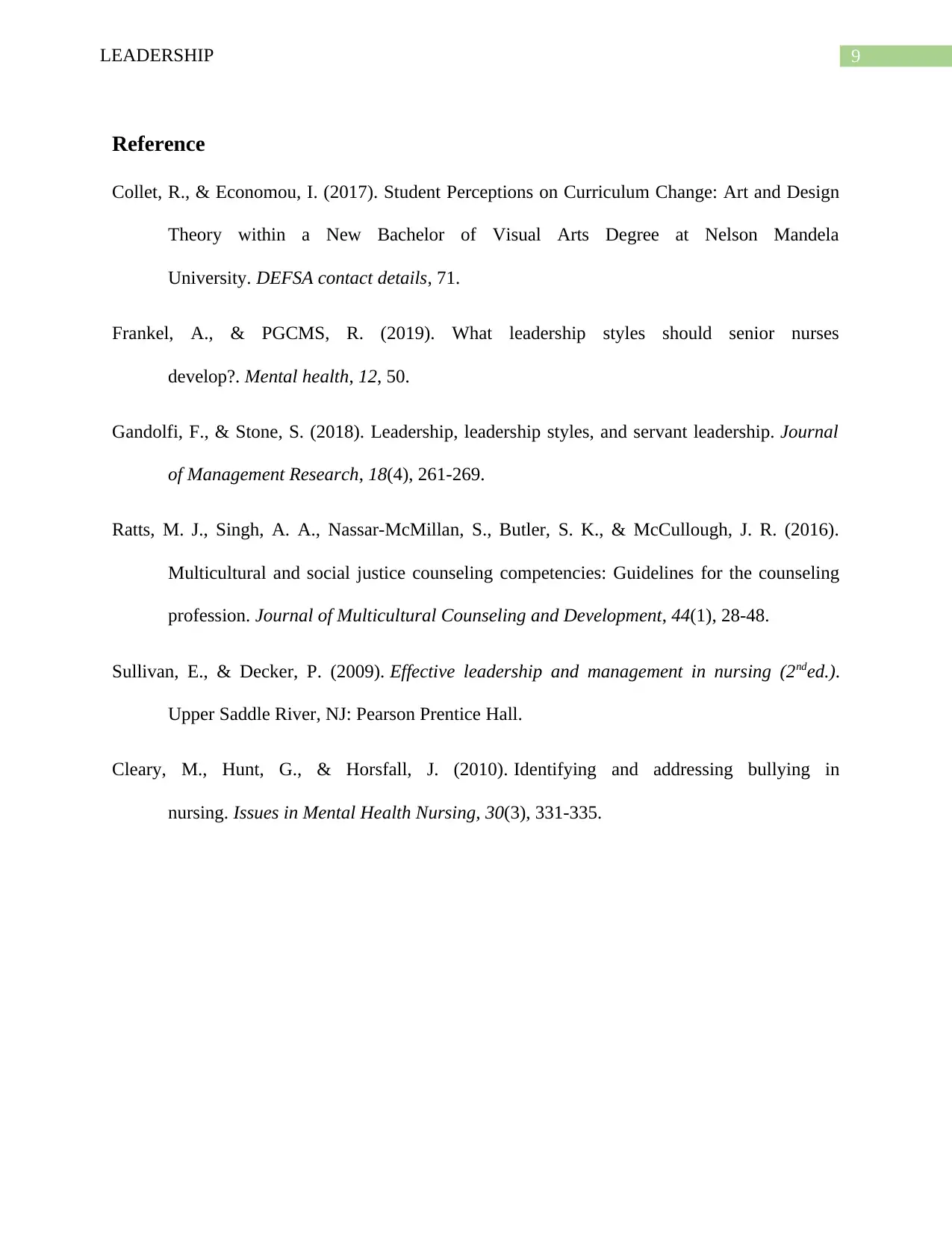
9LEADERSHIP
Reference
Collet, R., & Economou, I. (2017). Student Perceptions on Curriculum Change: Art and Design
Theory within a New Bachelor of Visual Arts Degree at Nelson Mandela
University. DEFSA contact details, 71.
Frankel, A., & PGCMS, R. (2019). What leadership styles should senior nurses
develop?. Mental health, 12, 50.
Gandolfi, F., & Stone, S. (2018). Leadership, leadership styles, and servant leadership. Journal
of Management Research, 18(4), 261-269.
Ratts, M. J., Singh, A. A., Nassar‐McMillan, S., Butler, S. K., & McCullough, J. R. (2016).
Multicultural and social justice counseling competencies: Guidelines for the counseling
profession. Journal of Multicultural Counseling and Development, 44(1), 28-48.
Sullivan, E., & Decker, P. (2009). Effective leadership and management in nursing (2nded.).
Upper Saddle River, NJ: Pearson Prentice Hall.
Cleary, M., Hunt, G., & Horsfall, J. (2010). Identifying and addressing bullying in
nursing. Issues in Mental Health Nursing, 30(3), 331-335.
Reference
Collet, R., & Economou, I. (2017). Student Perceptions on Curriculum Change: Art and Design
Theory within a New Bachelor of Visual Arts Degree at Nelson Mandela
University. DEFSA contact details, 71.
Frankel, A., & PGCMS, R. (2019). What leadership styles should senior nurses
develop?. Mental health, 12, 50.
Gandolfi, F., & Stone, S. (2018). Leadership, leadership styles, and servant leadership. Journal
of Management Research, 18(4), 261-269.
Ratts, M. J., Singh, A. A., Nassar‐McMillan, S., Butler, S. K., & McCullough, J. R. (2016).
Multicultural and social justice counseling competencies: Guidelines for the counseling
profession. Journal of Multicultural Counseling and Development, 44(1), 28-48.
Sullivan, E., & Decker, P. (2009). Effective leadership and management in nursing (2nded.).
Upper Saddle River, NJ: Pearson Prentice Hall.
Cleary, M., Hunt, G., & Horsfall, J. (2010). Identifying and addressing bullying in
nursing. Issues in Mental Health Nursing, 30(3), 331-335.
1 out of 10
Related Documents
Your All-in-One AI-Powered Toolkit for Academic Success.
+13062052269
info@desklib.com
Available 24*7 on WhatsApp / Email
![[object Object]](/_next/static/media/star-bottom.7253800d.svg)
Unlock your academic potential
Copyright © 2020–2026 A2Z Services. All Rights Reserved. Developed and managed by ZUCOL.





